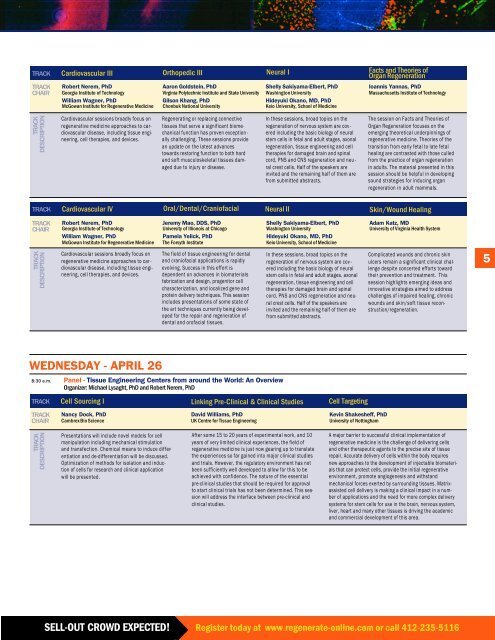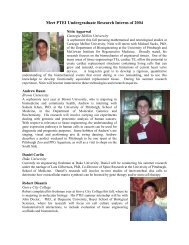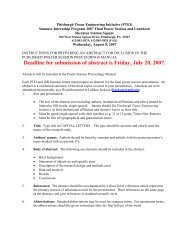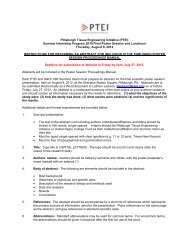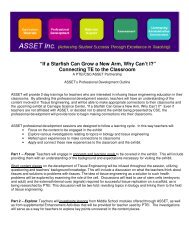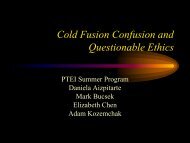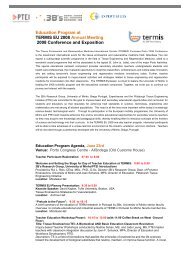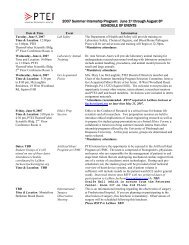SEE INSIDE - Pittsburgh Tissue Engineering Initiative
SEE INSIDE - Pittsburgh Tissue Engineering Initiative
SEE INSIDE - Pittsburgh Tissue Engineering Initiative
Create successful ePaper yourself
Turn your PDF publications into a flip-book with our unique Google optimized e-Paper software.
TRACK<br />
TRACK<br />
CHAIR<br />
Cardiovascular III Orthopedic III Neural I Facts and Theories of<br />
Organ Regeneration<br />
Robert Nerem, PhD<br />
Georgia Institute of Technology<br />
William Wagner, PhD<br />
McGowan Institute for Regenerative Medicine<br />
Aaron Goldstein, PhD<br />
Virginia Polytechnic Institute and State University<br />
Gilson Khang, PhD<br />
Chonbuk National University<br />
Shelly Sakiyama-Elbert, PhD<br />
Washington University<br />
Hideyuki Okano, MD, PhD<br />
Keio University, School of Medicine<br />
Ioannis Yannas, PhD<br />
Massachusetts Institute of Technology<br />
TRACK<br />
DESCRIPTION<br />
Cardiovascular sessions broadly focus on<br />
regenerative medicine approaches to cardiovascular<br />
disease, including tissue engineering,<br />
cell therapies, and devices.<br />
Regenerating or replacing connective<br />
tissues that serve a significant biomechanical<br />
function has proven exception -<br />
ally challenging. These sessions provide<br />
an update on the latest advances<br />
towards restoring function to both hard<br />
and soft musculoskeletal tissues damaged<br />
due to injury or disease.<br />
In these sessions, broad topics on the<br />
regeneration of nervous system are cov -<br />
ered including the basic biology of neural<br />
stem cells in fetal and adult stages, axonal<br />
regeneration, tissue engineering and cell<br />
therapies for damaged brain and spinal<br />
cord, PNS and CNS regeneration and neu -<br />
ral crest cells. Half of the speakers are<br />
invited and the remaining half of them are<br />
from submitted abstracts.<br />
The session on Facts and Theories of<br />
Organ Regeneration focuses on the<br />
emerging theoretical underpinnings of<br />
regenerative medicine. Theories of the<br />
transition from early fetal to late fetal<br />
healing are contrasted with those culled<br />
from the practice of organ regeneration<br />
in adults. The material presented in this<br />
session should be helpful in developing<br />
sound strategies for inducing organ<br />
regeneration in adult mammals.<br />
TRACK<br />
Cardiovascular IV Oral/Dental/Craniofacial Neural II Skin/Wound Healing<br />
TRACK<br />
CHAIR<br />
Robert Nerem, PhD<br />
Georgia Institute of Technology<br />
William Wagner, PhD<br />
McGowan Institute for Regenerative Medicine<br />
Jeremy Mao, DDS, PhD<br />
University of Illionois at Chicago<br />
Pamela Yelick, PhD<br />
The Forsyth Institute<br />
Shelly Sakiyama-Elbert, PhD<br />
Washington University<br />
Hideyuki Okano, MD, PhD<br />
Keio University, School of Medicine<br />
Adam Katz, MD<br />
University of Virginia Health System<br />
TRACK<br />
DESCRIPTION<br />
Cardiovascular sessions broadly focus on<br />
regenerative medicine approaches to car -<br />
diovascular disease, including tissue engineering,<br />
cell therapies, and devices.<br />
The field of tissue engineering for dental<br />
and craniofacial applications is rapidly<br />
evolving. Success in this effort is<br />
dependent on advances in biomaterials<br />
fabrication and design, progenitor cell<br />
characterization, and localized gene and<br />
protein delivery techniques. This session<br />
includes presentations of some state of<br />
the art techniques currently being developed<br />
for the repair and regeneration of<br />
dental and orofacial tissues.<br />
In these sessions, broad topics on the<br />
regeneration of nervous system are cov -<br />
ered including the basic biology of neural<br />
stem cells in fetal and adult stages, axonal<br />
regeneration, tissue engineering and cell<br />
therapies for damaged brain and spinal<br />
cord, PNS and CNS regeneration and neural<br />
crest cells. Half of the speakers are<br />
invited and the remaining half of them are<br />
from submitted abstracts.<br />
Complicated wounds and chronic skin<br />
ulcers remain a significant clinical challenge<br />
despite concerted efforts toward<br />
their prevention and treatment. This<br />
session highlights emerging ideas and<br />
innovative strategies aimed to address<br />
challenges of impaired healing, chronic<br />
wounds and skin/soft tissue reconstruction/regeneration.<br />
5<br />
WEDNESDAY - APRIL 26<br />
8:30 a.m.<br />
TRACK<br />
TRACK<br />
CHAIR<br />
Panel - <strong>Tissue</strong> <strong>Engineering</strong> Centers from around the World: An Overview<br />
Organizer: Michael Lysaght, PhD and Robert Nerem, PhD<br />
Cell Sourcing I Linking Pre-Clinical & Clinical Studies Cell Targeting<br />
Nancy Dock, PhD<br />
Cambrex Bio Science<br />
David Williams, PhD<br />
UK Centre for <strong>Tissue</strong> <strong>Engineering</strong><br />
Kevin Shakesheff, PhD<br />
University of Nottingham<br />
TRACK<br />
DESCRIPTION<br />
Presentations will include novel models for cell<br />
manipulation including mechanical stimulation<br />
and transfection. Chemical means to induce differentiation<br />
and de-differentiation will be discussed.<br />
Optimization of methods for isolation and induction<br />
of cells for research and clinical application<br />
will be presented.<br />
After some 15 to 20 years of experimental work, and 10<br />
years of very limited clinical experiences, the field of<br />
regenerative medicine is just now gearing up to translate<br />
the experiences so far gained into major clinical studies<br />
and trials. However, the regulatory environment has not<br />
been sufficiently well developed to allow for this to be<br />
achieved with confidence. The nature of the essential<br />
pre-clinical studies that should be required for approval<br />
to start clinical trials has not been determined. This session<br />
will address the interface between pre-clinical and<br />
clinical studies.<br />
A major barrier to successful clinical implementation of<br />
regenerative medicine is the challenge of delivering cells<br />
and other therapeutic agents to the precise site of tissue<br />
repair. Accurate delivery of cells within the body requires<br />
new approaches to the development of injectable biomaterials<br />
that can protect cells, provide the initial regenerative<br />
environment, promote angiogenesis and withstand<br />
mechanical forces exerted by surrounding tissues. Matrixassisted<br />
cell delivery is making a clinical impact in a number<br />
of applications and the need for more complex delivery<br />
systems for stem cells for use in the brain, nervous system,<br />
liver, heart and many other tissues is driving the academic<br />
and commercial development of this area.<br />
SELL-OUT CROWD EXPECTED! Register today at www.regenerate-online.com or call 412-235-5116


